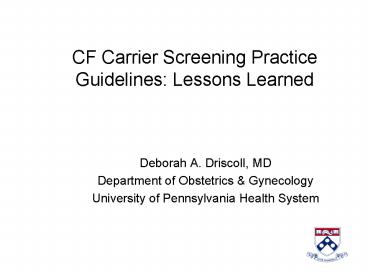CF Carrier Screening Practice Guidelines: Lessons Learned - PowerPoint PPT Presentation
1 / 17
Title:
CF Carrier Screening Practice Guidelines: Lessons Learned
Description:
... al. (2004) Cystic fibrosis population carrier screening: ... Mennuti MT et al. (1999) Screening for cystic fibrosis carrier state. Obstet Gynecol 93:456-61. ... – PowerPoint PPT presentation
Number of Views:102
Avg rating:3.0/5.0
Title: CF Carrier Screening Practice Guidelines: Lessons Learned
1
CF Carrier Screening Practice Guidelines Lessons
Learned
- Deborah A. Driscoll, MD
- Department of Obstetrics Gynecology
- University of Pennsylvania Health System
2
History of CF Carrier Screening
- 1989 CFTR gene common mutation identified in
CF patients - 1997 NIH Consensus Development Conference
- First call for population-based screening
- 1997 NIH workshop
- Recommend development of guidelines, educational
material, informed consent, laboratory standards - 2001 ACOG/ACMG Clinical Laboratory Guidelines
3
Goal of CF Carrier Screening
- Identify couples at risk for having children with
classic CF - Allow couple to make informed reproductive
decision
4
Purpose of Guidelines
- Facilitate Implementation of CF carrier screening
- Educate physicians
- Provide recommendations on who should be offered
CF carrier screening - Provide materials to assist with implementation
- Consents, sample patient letters, patient
education brochures
5
Initial Concerns with CF Carrier Screening
- Improper use of testing
- Prenatal carrier screening versus diagnostic
testing - Use of expanded panels or DNA sequencing
- Adequacy of pre-test counseling
- Are patients making informed decisions or has CF
carrier screening become a routine test? - Providers interpretation of test results
provision of post-test counseling - Are patients receiving a revised risk assessment
or simply being told the test result is negative
or positive? - Documentation
6
Evaluation of CF carrier screening experience in
U.S.
- Laboratory practice and mutation panel
- Practitioner experience with implementation of CF
carrier screening
7
How familiar are ObGyns with CF carrier
screening guidelines?Does this impact their
knowledge and practice behavior?
8
CF Carrier ScreeningPractice Patterns of Ob/Gyns
- Questionnaire mailed to 1165 ACOG fellows in
Sept. 2003 - 600 randomly selected
- 565 Collaborative Ambulatory Research Network
(CARN) - 64 response rate (57.9 CARN)
- Analysis
- Mann Whitney U test for group differences on
ordinal measures - Univariate analysis of variance with gender and
residency as fixed factors for group differences
of continuous measures - Descriptive statistics reported as meanSEM
Morgan MA et al. (2003) Practice patterns of
obstetrician-gynecologists regarding
preconception and prenatal screening for cystic
fibrosis. Genet Med. 6(5)450-5.
9
ObGyn Practice Patterns
- Routinely inquire about family history of CF
- Pregnant 88.7
- Non-pregnant 13.5
- Only if attempting pregnancy (36.4)
- Always provide information regarding screening
- Pregnant 86.6
- Non-pregnant 6.3
- Only if attempting pregnancy (38.4)
10
CF Carrier Screening in PregnancyPractice
Patterns of Ob/Gyns
- Offer to all patients 65.8
- Offer to some patients 32
- At patients request 67.1
- Family history 61.8
- Partner with CF 51.2
- Ethnicity 46.7
- All of above 27.4
- Never offer 2.2
11
Preconception CF Carrier Screening Practice
Patterns of Ob/Gyns
- Offer to all patients 13
- Offer to some patients 67.7
- At patients request 80.1
- Family history 54.7
- Partner with CF 43.6
- Ethnicity 25.2
- All of above 18
- Never offer 19
12
How familiar are ObGyns with CF carrier
screening guidelines?
- Majority (82) aware of recommendations to offer
CF carrier testing - Majority admitted their practice pattern had
changed esp. the readers and skimmers (63.7) - Individuals who read the document (19.2) more
likely to answer correctly except on more complex
scenarios such as interpretation of results/risk
assessment
13
How familiar are ObGyns with CF carrier
screening guidelines?
- A Caucasian couple has CF carrier screening. The
woman is found to be a carrier and her partner
has a negative CF carrier screening test. How
would you describe their chance of having a child
with CF compared to the Caucasian population that
has not had the screening test? Lower,
Higher or about the same - 22 score correctly
14
ObGyns Concerns about CF Carrier Screening
higher among MDs 15 years from residency
15
Summary
- Majority are offering CF carrier screening in
prenatal setting - Most offer routinely and do not use criteria to
determine which patients to offer screening - Most do not offer preconception carrier screening
unless patient requests, family history or
affected partner
16
Lessons Learned
- Guidelines influence practice behavior
- Guidelines are important source of information
- Keep guidelines simple
- Continuing medical education on genetics and CF
needed to increase comfort level - We need to do educate public and practitioners
about the benefits of preconception screening - Utilize alternative venues to reach all providers
about new guidelines
17
References
- Watson M et al. (2004) Cystic fibrosis population
carrier screening 2004 revision of American
College of Medical Genetics mutation panel. Genet
Med 6 387-91. - Grody WW et al. (2001) Laboratory standards and
guidelines for population-based cystic fibrosis
carrier screening. Genet Med 3149-54. - Morgan MA et al. (2005) Impact of self-reported
familiarity with guidelines for cystic fibrosis
carrier screening. Obstet Gynecol 105 1355-61. - Morgan MA et al. (2004) Practice patterns of
obstetrician-gynecologists regarding
preconception and prenatal screening for cystic
fibrosis. Genet Med 6 450-5. - Watson MS et al. (2002) Cystic fibrosis carrier
screening issues in implementation.Genet Med. 4
407-9. - Mennuti MT et al. (1999) Screening for cystic
fibrosis carrier state. Obstet Gynecol 93456-61.































